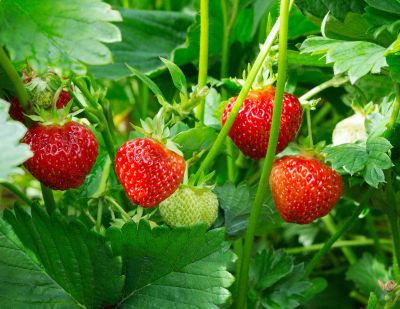Why are There No Strawberries?
There are several reasons for poor strawberry production, everything from poor growing conditions to improper watering. Here are some of the most common reasons for strawberries with no fruit: Poor growing conditions – Although they’ll usually grow just about anywhere, strawberries prefer well-draining, organic soil and a combination of warm and cool growing conditions in order to produce adequate fruit. These plants grow best on warm days and cool nights. Plants that are grown when it’s too hot will likely not produce many berries if any. Likewise, if a cold snap occurs, especially while the plants are in bloom, the open blossoms can be damaged, resulting in little to no fruit. Watering issues – Either too little or too much water can also affect fruit production in strawberry plants, which have rather shallow root systems. These plants take in most of their water from the top few inches of the soil, which unfortunately tends to dry out the quickest. In addition, those grown in containers dry out faster too. In order to compensate for this, strawberry plants require plenty of water throughout the growing season in order to produce an abundance of fruit. However, too much water can be detrimental to the plants by rotting their crowns. If this happens, not only will plant growth and fruiting be limited, but the plants will likely die as well. Pests or diseases – There are many pests and diseases that can affect strawberry plants. When strawberries become infested by insects, such as Lygus bugs, or infected with diseases like root rot, they won’t produce well, if at all. Therefore, you should keep a check on insect pests and try to keep plant foliage as dry as possible during watering to prevent future issues with fungal infections or other problems, treating as needed. Poor or improper fertilizing – As with water, too little or too much fertilizer can become a problem when growing strawberries. Without the proper nutrients, strawberries will not grow well. As a result, fruit production may be low. Amending the soil with compost or other organic materials will go a long way in adding beneficial nutrients to the plants. However, too much fertilizer, especially nitrogen, can also limit fruit production. In fact, too much nitrogen will cause excessive foliage growth with few to no strawberries. So if your strawberry plants are big but no strawberries, cut back on the nitrogen fertilizer. This is also why a strawberry will not bloom. It may help to add more phosphorus to the soil as well if this is the case. Age of the plant – Finally, if your strawberry plants aren’t producing, they may simply be too young. Most varieties produce little to no fruit within the first year. Instead, the plants focus more energy on establishing strong roots. This is why it is often recommended to pinch out flower buds during the first year as well, which of course is where the fruit comes from. During the second year and later, the plant roots will have become established enough to handle flowering and fruiting.
